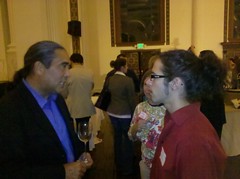 Last week from Wednesday, October 6 to Friday, October 8 many people unsatisfied with our current food and agriculture system in California met in downtown Los Angeles for the Roots of Change Network Summit (ROCNS). You can see the agenda on the official roots of change website here: http://rootsofchange.org/content/roots-change-network-summit-2010.
Last week from Wednesday, October 6 to Friday, October 8 many people unsatisfied with our current food and agriculture system in California met in downtown Los Angeles for the Roots of Change Network Summit (ROCNS). You can see the agenda on the official roots of change website here: http://rootsofchange.org/content/roots-change-network-summit-2010. It kicked off with a wonderful reception at Vibiana’s on Main St in Downtown LA. Top chefs and restaurants from around the LA area cooked up a wide variety of delicious small plates for guests attending the $100 ticket event. The chefs as well as many local farmers were there enjoying the reception and socializing with their numerous foodie fans. Alongside the tables of food were various organizations working towards a better food system such as
California Food Policy Advocates,The Los Angeles Food Bank, and Food & Water Watch. Attendees had the opportunity to speak with these different food system reform advocates to learn what they can personally do to help out. The reception was an evening of delicious entertainment but the real purpose of ROCNS was unveiling the Roots of Change California Healthy Food and Agriculture Platform.
The next day started off in the morning with some brief opening remarks by ROC co-chairs Edith Jessup and Maricela Morales. Next was an explanation of the ROC Network Systems Dynamic Mapping Project led by Scott Spann. This flow chart connects thoroughly connects the different aspects of the food and agriculture system providing insight into how we can effectively change it.
The last segment before the lunch break talked about the relationships between our health and food systems. Claire Haskell, Director of Disease Prevention and Health Advancement, UnitedHealth Group, repeatedly stressed that “We cannot change our health system without changing the food system first.” This is easy to understand when you consider that according to a 2007 report on causes of death in the USA done by the Centers for Disease Control and Prevention the two leading causes of death are stroke and heart disease. Although many factors affect this such as smoking, alcohol, and inactivity, our diets play a critical part here. Until we create a more accessible, healthy food system (especially for low-income groups) we will continue to treat preventable diseases directly related to overeating and poor nutrition.
After lunch the discussion shifted to an overview of the California Healthy Food and Agriculture Platform. Led by Maria Echaveste, Former Deputy Chief of Staff, Clinton Administration and Co-founder of Nueva Vista Group, and Harold Goldstein, Executive Director, CA Center for Health Policy Advocacy, every line of the platform was read to reinforce just how important this is to our society. Afterwards we broke into focus groups to further discuss the individual planks of the platforms and how they can be improved.
Many of you might be wondering how a comprehensive overhaul of our food and agriculture system can be accomplished amidst our ongoing state budget crisis. Each plank outlines steps to be taken requiring no significant additional funding as well as what can be done with additional funding. Of course the more money that can be raised the better, but simply by better financial planning and appropriation of funds there are many possibilities to improve our system despite our financial situation.
Friday morning started off by honoring State Secretary of Food and Agriculture A.G. Kawamura for his ongoing participation in this crucial food system reform. He spoke about our situation and the mistakes of our agriculture practices for the past several decades that have brought us to our current crisis. Blaming others for where we are now will not help anything. He stressed that "it is a new age and we have to get it right now, because we don’t have the luxury of getting it wrong."
Most of the participants at the summit were from the older generation and I found it interesting that I was one of the youngest attendees. Its wonderful that so many people truly want to change things for the better but I am a bit dismayed by the under representation of the youth because these are our challenges we face. While the baby boomers will pass away before any projected major crisis will likely hit, it is people my age and younger who will suffer the most if we continue to allow unsustainable agriculture methods.
That being said, there is clearly an interest among the youth as shown by the talks with Tim Galarneau and others from Live Real, an organization of youth leaders creating change within our food system. A main focus of Live Real is the creation of community gardens, especially in low income neighborhoods where people will benefit the most. It was truly inspiring to see that there are others my age who are working towards healthier food for everyone.
Our current food and agriculture system is broken. It encourages people to consume large amounts of sugary processed foods with misleading health claims stating that diets low in cholesterol and fat may help prevent heart disease and other illnesses. We have eaten up this advice and love to fill up on sugary, salty foods that wreak havoc on our bodies when consumed in excess. Roots of Change shows us that there is an alternative and the diverse group of people who gathered at the network summit prove there is a vested interest in a change for the better. Although we have a lot of work to accomplish the proposed goals of the platform we are well on our way their to doing so.

No comments:
Post a Comment